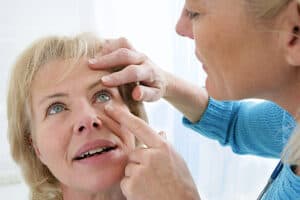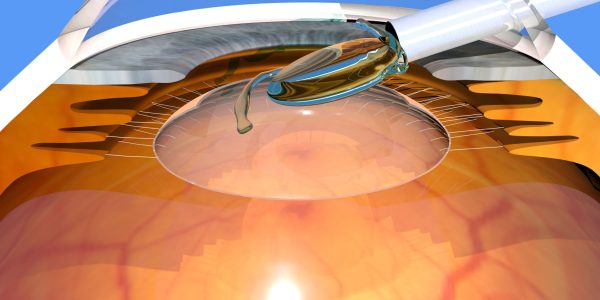
Cataracts
An estimated 50 percent of all adults age 65 and older have cataracts or have had them surgically removed. A cataract is the clouding of the eye’s natural lens, causing blurry or fuzzy vision. If left untreated, the eye condition can lead to blindness. Early stages of cataracts can be treated with prescription glasses and contact lenses. Once the cataract becomes so severe that it impairs daily activities, it must be surgically removed.
Presbyopia
Over time, the natural lens inside your eye become less flexible, making it increasingly difficult for them to change focus from far to near objects. This results in presbyopia, an age-related condition that results in the loss of near vision. Most adults begin to experience presbyopia in their mid-40s. Presbyopia can be treated with prescription reading glasses. However, patients who wish to see clearly again without glasses may be candidates for monovision, a procedure that corrects one eye for distance vision while leaving the eye other nearsighted. Following the procedure, the eyes will work in tandem to focus and see clearly at most distances.
Macular Degeneration
Macular degeneration, also known as age-related macular degeneration (AMD), is the leading cause of vision loss among adults age 65 and older. The eye condition is characterized by the deterioration of the macula, which is the small, central part of the retina. When the macula breaks down, dark, empty spots in the central vision can appear, drastically affecting one’s ability to see well. Treatment for macular degeneration includes nutritional supplements (AREDS II formula) and sometimes intraocular medications, which may slow down the progression of the disease and prolong vision. Lifestyle changes such as quitting smoking, eating a diet rich in eye-friendly nutrients (such as leafy green vegetables) and exercising regularly can also slow down vision loss caused by AMD.
If you are noticing changes in your vision, please contact Optima Eye. Following a thorough eye examination, Dr. Mandel and his subspecialist associates can discuss your visual symptoms and treatment options. Please call 877-210-2020 ext. 3 today.



